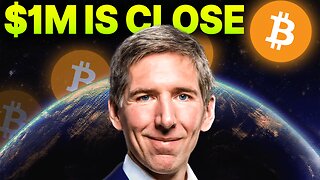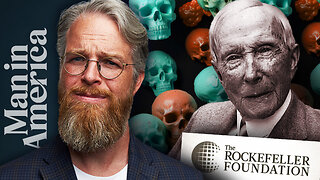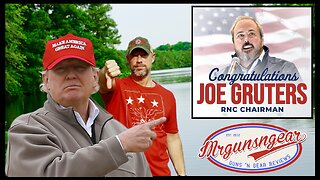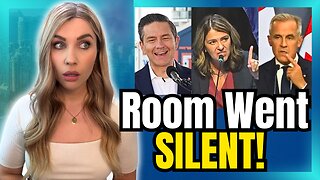Premium Only Content

Hitler's Speech in Munich – September 12, 1923
Background Leading Up to Hitler's Speech in Munich on September 12, 1923
Post-WWI Germany: Germany was reeling from the aftermath of World War I and the Treaty of Versailles, which imposed severe reparations and territorial losses. The Weimar Republic, established in 1919, faced significant economic and political challenges.
Hyperinflation Crisis: By 1923, Germany was experiencing hyperinflation, causing widespread economic hardship. The value of the German mark plummeted, leading to skyrocketing prices and severe shortages of goods.
Political Instability: The Weimar government struggled to maintain control amid political extremism from both the left and the right. The Nazi Party, led by Adolf Hitler, capitalized on this instability, gaining support through nationalist rhetoric and promises to restore Germany's former glory.
Hitler’s Rise: Adolf Hitler, leader of the National Socialist German Workers' Party (NSDAP), was increasingly recognized for his oratory skills and radical ideas. He aimed to position himself and the Nazi Party as the solution to Germany's problems.
Hitler's Speech in Munich – September 12, 1923
On September 12, 1923, Adolf Hitler delivered a speech in Munich, addressing the dire state of the nation and outlining his vision for Germany's future.
Key Points of Hitler's Speech:
Condemnation of the Weimar Republic: Hitler began by harshly criticizing the Weimar government, blaming it for Germany’s economic woes and political instability. He accused the government of betraying the German people and capitulating to foreign powers.
Critique of the Treaty of Versailles: A significant portion of the speech was devoted to denouncing the Treaty of Versailles. Hitler argued that the treaty was a humiliating diktat that unjustly punished Germany and was responsible for the nation's suffering.
Economic Desperation: Hitler highlighted the economic hardships faced by ordinary Germans due to hyperinflation. He used vivid examples of how the value of money had eroded, emphasizing the struggle to afford basic necessities.
Nationalism and Unity: Emphasizing nationalism, Hitler called for a united effort to rebuild Germany. He argued that only through national unity and a strong, centralized leadership could Germany overcome its challenges and reclaim its rightful place in the world.
Identifying Enemies: Hitler incorporated themes of identifying those he viewed as responsible for Germany's problems. He portrayed certain groups as corrupting influences and argued that removing their influence was essential for the nation's recovery.
Call to Action: Hitler called on his supporters to take decisive action against the Weimar government and to support the Nazi Party’s efforts to seize power. He emphasized the need for radical change and the urgency of their mission.
Analysis:
Hitler’s speech on September 12, 1923, was a critical moment in his efforts to mobilize support for the Nazi Party by exploiting Germany’s economic and political crises.
Exploiting Economic Hardship: By focusing on the hyperinflation crisis, Hitler tapped into the widespread economic desperation felt by many Germans. His portrayal of the Weimar government as inept and responsible for the crisis resonated with those who were struggling to survive.
Nationalist Appeal: The emphasis on nationalism and unity was a strategic effort to rally the German people around a common cause. By promoting a vision of national revival and strength, Hitler sought to inspire hope and to mobilize support for the Nazi Party.
Identifying Culprits: The use of rhetoric identifying those he blamed for Germany's problems was intended to unite his followers against a common perceived threat and to justify the Nazi Party’s radical agenda.
Vision for the Future: Hitler’s vision of a strong, centralized leadership was a direct appeal for support for his own leadership and the Nazi Party’s plans. He presented himself as the only leader capable of rescuing Germany from its current plight and restoring its former glory.
Call to Action: The call to action was a crucial element of the speech, encouraging his followers to actively support the Nazi Party’s efforts to overthrow the Weimar government. This urgency and sense of mission were intended to galvanize his base and to prepare them for future confrontations.
Overall, Hitler’s speech in Munich on September 12, 1923, was a strategic effort to exploit the economic and political crises facing Germany. By condemning the Weimar government, denouncing the Treaty of Versailles, promoting nationalism, and identifying those he held responsible for Germany’s suffering, Hitler aimed to position the Nazi Party as the solution to Germany’s problems. This speech was an important step in his efforts to gain broader support and to lay the groundwork for the Nazi Party’s eventual rise to power.
-
 1:31:29
1:31:29
Brandon Gentile
1 day ago25 Year Wall Street INSIDER: $1M Bitcoin Soon Is Just The START
18.2K -

SpartakusLIVE
8 hours ago#1 Birthday Boy Celebrates with MASSIVE and HUGE 4.8-Hour Stream
58.6K -
 55:54
55:54
Man in America
9 hours agoFrom Oil Barons to Pill Pushers: The Rockefeller War on Health w/ Jeff Adam
47K6 -
 3:02:18
3:02:18
Barry Cunningham
7 hours agoBREAKING NEWS: PRESIDENT TRUMP THIS INSANITY MUST END NOW!
92.8K193 -
 3:58:27
3:58:27
StevieTLIVE
6 hours agoWednesday Warzone Solo HYPE #1 Mullet on Rumble
43.4K -
 5:58
5:58
Mrgunsngear
7 hours ago $3.67 earnedBreaking: The New Republican Party Chairman Is Anti 2nd Amendment
29.3K14 -
 2:28:35
2:28:35
Geeks + Gamers
6 hours agoGeeks+Gamers Play- MARIO KART WORLD
28.7K -
![(8/27/2025) | SG Sits Down Again w/ Sam Anthony of [Your]News: Progress Reports on Securing "We The People" Citizen Journalism](https://1a-1791.com/video/fww1/d1/s8/6/G/L/3/c/GL3cz.0kob.1.jpg) 29:34
29:34
QNewsPatriot
7 hours ago(8/27/2025) | SG Sits Down Again w/ Sam Anthony of [Your]News: Progress Reports on Securing "We The People" Citizen Journalism
24.1K6 -
 25:12
25:12
Jasmin Laine
11 hours agoDanielle Smith’s EPIC Mic Drop Fact Check Leaves Crowd FROZEN—Poilievre FINISHES the Job
24.5K25 -
 11:33:26
11:33:26
ZWOGs
15 hours ago🔴LIVE IN 1440p! - SoT w/ Pudge & SBL, Ranch Sim w/ Maam & MadHouse, Warzone & More - Come Hang Out!
14K